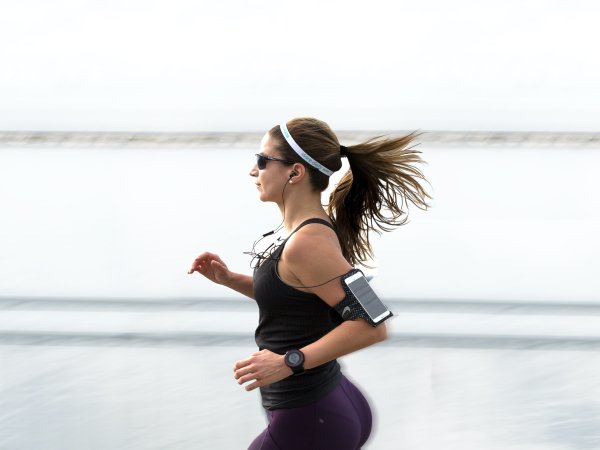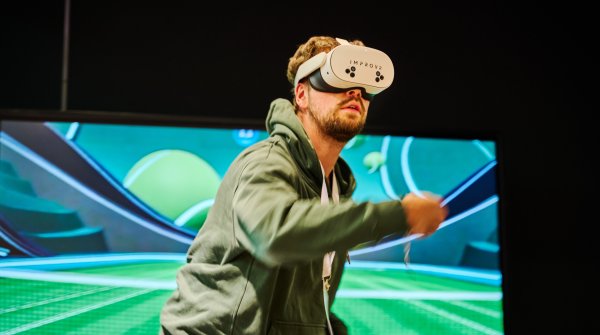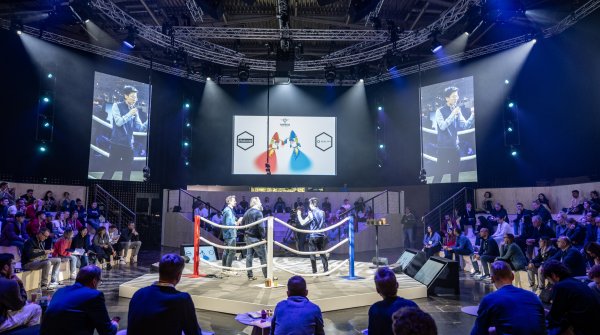Apple has just launched its new Watch Series 9 and Ultra 2 smartwatches. Both are "the ultimate tool for healthy living," according to the U.S. company. Apple promises, "When you wear them, you have a fitness partner that can measure all the ways you move." Sports psychologist Johanna Constantini explains what makes such fitness gadgets successful: "These tracking devices aim to reward us for our achievements by making them measurable - to us and to others on social media."
Sharing achievements, comparing them, hoping for likes and thus for rewards and feelings of happiness - the classic addictive mechanisms take effect here, only not tied to toxic substances. According to Johanna Constantini, motivating oneself in this way and conquering one's inner pig doesn't have to be fundamentally wrong or bad: "The dose makes the poison. And the question is: Am I still doing it for me, because I am driven by my own intrinsic motivation? Or am I just doing it more for the data, for the likes?"

The manufacturers of the wearables promise "human enhancement," the optimization of the human body by tracking athletic performance. To a certain extent, this actually seems to work. According to a study in the journalMedicine & Science in Sports & Exercise, active people can run 3.5 percent more efficiently on average with a smartwatch. That means they can cover a correspondingly longer distance at the same speed - or they run their usual distance faster, using less energy.
Another study in the magazine "Frontiers in Sports and Active Living" claims to have found that athletes with smartwatch trainers save an average of five percent energy. They can thus supply their muscles with a greater proportion of the oxygen they inhale. The undeniable advantage of such gadgets is that they allow athletes to stay much more precisely within their optimal pulse range. Here, even small advances have a decisive effect: Running one percent more efficiently can save more than four minutes over ten kilometres.
Anyone who doesn't even start running because the smartwatch battery is empty, or who turns back because they forgot their watch at home, should question themselves, psychologist Johanna Constantini told ISPO.com. For her, the distinction looks like this: "If I'm training for a marathon, and the watch helps me maintain my speed, then that's not reprehensible. But if I'm just running for others to see, then of course it's difficult. You have to ask yourself the question: Would I go running even if I didn't wear the watch?" If the answer is "no," then sports will degenerate into further digital stress, which already shapes our lives to a large extent.
Children instinctively know exactly when they want to move - and when they are tired and want to rest. As we grow up, we often lose this intuition and gut feeling. Experts therefore recommend breaking away from strict and rigid training plans, and instead focusing on "intuitive training". This means: athletes learn to understand their body's mental and physical signals and adapt their training so that they are rested, full of energy and ready to train. This does not mean training only on a whim and throwing all training plans out the window - especially since there are enough days anyway when the training plan and the readiness to train go together.
But if you feel that intense strength training today would only aggravate the already existing muscle soreness, you should take the liberty to deviate from your training plan - and swap the days of the next planned workouts, rides or runs, for example. For performance, this doesn't mean a problem. After all, studies have shown that there are no measurable deviations in training results when athletes are free to choose which workout they do on which day of the week. The prerequisite is that none of the planned units are omitted, and the load is increased over time as specified in the training plan.
Sports psychologist Johanna Constantini also recommends common sense for healthy training: "We should manage to let equipment be equipment sometimes. Because we ourselves have the best sense and feeling for what is good for us at the moment." The parameters that are decisive for this include the sleep of the last few nights, the current stress load, the diet of the past few days, the general body feeling - and for women, the cycle. Those who pay attention to this ensure a balanced relationship between stress and recovery, with which the greatest performance progress can be achieved.
If you want to listen more to your gut feeling and less to the digital coach, you need a digital detox - not only for excessive use of social media, but also for sports. If you still want the smartwatch to be present during training, it makes sense to at least set it to "do not disturb" mode. Then it can track performance data - but at least the time of the workout remains an analogue space, free of calls, text messages, WhatsApp and notifications that cause stress.
Expert Constantini recommends as a sensible strategy for more analogue sports: "Maybe start by running offline twice out of five times. After all, you can look at your watch when you start running at home - and then a second time when you get back home. Then you also know how long you've been running." Those who train in a group can agree that all participants will start without a tracker once or twice a week.
Those who have become so accustomed to digital training that sport without tracking has long since become unthinkable will find the switch difficult at first, the Tyrolean psychologist knows: "It's like any addiction - trying to break free from it tends to be accompanied by an unpleasant feeling. But if it's not easy, it's usually the right way to go." Her general tip: "I advocate not cutting back from 100 to 0, but successively trying to exercise offline more and more often."
The next data revolution in sports is just around the corner: training with artificial intelligence. Google has just unveiled the Pixel 8 and Pixel 8 Pro, which it claims are the first smartphones to have Generative AI - the technology of chatbots like ChatGPT - integrated directly into the device. And it won't be long before this AI also finds its way into smartwatches and other tracking devices. The digital coach will thus get to know "his" athlete even better and be able to offer even more individualized coaching - in which, for example, genetic information about the athlete can then also play a role.
Bosch Sensortec currently offers the BHI260AP, the first self-learning AI sensor for installation in smartwatches and comparable devices. The gadgets can thus not only record predefined workouts as before - but also analyse the movements of the entire body with their sensors. "They are able to learn any new fitness activity based on repetitive, cyclical patterns," the developers say. Users can thus virtually train their trainer - and teach him new exercises.
There are already numerous AI apps in the app stores that promise to make nutrition, fitness and sport smarter than ever before. The AI app Foodvisor for iOS and Android, for example, wants to recognize the number of calories eaten based on photos of the dishes. And the app Evolve AI (iOS, Android) promises to continuously adjust the load control during sports based on live data, just like a real trainer.
The possibilities of AI seem almost endless - and so do the demands on the personal responsibility of sportspeople. Sports psychologist Johanna Constantini recommends: "The better the technologies become, the more intensively you have to deal with them yourself - and not just let it happen to you. Here, more than ever, I have to arm myself with knowledge to recognize what I can use well for myself and what is a danger."
- Awards
- Mountain sports
- Bike
- Fitness
- Health
- ISPO Munich
- Running
- Brands
- Sustainability
- Olympia
- OutDoor
- Promotion
- Sports Business
- Textrends
- Triathlon
- Water sports
- Winter sports
- eSports
- SportsTech
- OutDoor by ISPO
- Heroes
- Transformation
- Sport Fashion
- Urban Culture
- Challenges of a CEO
- Trade fairs
- Sports
- Find the Balance
- Product reviews
- Newsletter Exclusive Area
- Magazine








